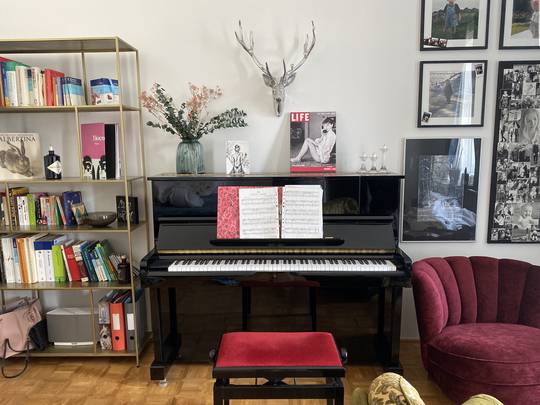Composer Tine Grgurevič drifts effortlessly between avant garde jazz, pop and electronic music with a keen sense for minimalism and clarity that distinguishes his style across genres. Since 2015, the Ljubljana-born pianist has produced 13 releases under the alias Bowrain, performed for the Slovenian Pavilion of the 56th Venice Biennale, and been a collaborator with South African collective The Brother Moves On. We recently spoke with Grgurevič in anticipation of his second stream for MusicTraveler.TV, a full performance of his recently released album 2020 Seconds Alive.
Where does your approach originate from?
My first influences were from classical music, where I started. Piano and orchestral sounds were my favorites.
Later on I went into jazz music. Kris Goessens, one of my teachers, who sadly is no longer with us, was a very important jazz figure in Holland who deeply influenced my approach. As a jazz pianist I was also influenced by the great masters (Keith Jarrett, Herbie Hancock, Miles Davis, Esbjörn Swenson Trio). I recorded two jazz albums at the start of my career, one in Philadelphia and another in Amsterdam.
But somehow jazz was not satisfying enough for me. I discovered electronics and started creating music with Nikos Kandarakis, an Amsterdam-based sound artist. Nikos introduced me to a new way of working. Suddenly, the freedom of not needing musicians to execute your ideas opened up a whole new realm of possibilities. However, I’m not by any means only interested in electronic music. Piano is my instrument and will remain so. I composed 2020 Seconds Alive because of my feeling for classical music and writing scores remains ever-present.
Where do you dream most of returning to play?
I’m dreaming of returning to live audiences. It doesn’t really matter if that’s a living room of 12 people or at Ljubljana’s Kino Siska in front of 300 people. I miss it and want it. It’s weird because we forgot how that is and we are forgetting how that feels. I also dream of returning to Gallus Hall at Cankerjev Dom, where I played recently, but in an empty room because of the pandemic.
But instead of dreaming about things that are out of my control, I’m thinking about how to produce and release as much as possible and how to finish some projects and release them online.
I’ve been fortunate enough to stream four live stream concerts. It’s like antibiotics for this period, but they will never replace the moment of live concerts. There’s no replacing the feeling I get when someone tells they met a friend they hadn’t seen for years at one of my performances, or any number of other similar such connections with an audience.

What are your currrent projects?
I’ve been focusing on vocals and songwriting. We’re currently promoting the CDs for 2020 Seconds Alive and have some new materials in sketches. On my own and with the new project Not Exactly Lost, which is a collaboration with a wonderful musician, Luka Uršič/ KALU. I’m looking forward to performing at Ljubljana’s Ment Festival in June and I am releasing an EP of music for the play “The Invisible" by Primož Ekart.
One of our missions at Music Traveler is connecting artists. Any dream collaboration you’d love to see happen?
Lately I’m thinking a lot about collaborating with a great studio. My next piano recording should happen in VoxTon studio in Berlin or maybe at Artesuono studio in Udine.
How has streaming changed your approach to music?
A stream is really different to a live performance. When there is a big video crew, they want you to sit a certain way and check the frame and at the end it’s 3 hours spent preparing. It’s strange to have a director who is directing you even if it’s your concert. With real concerts you always save the performance for the moment when it happens.


